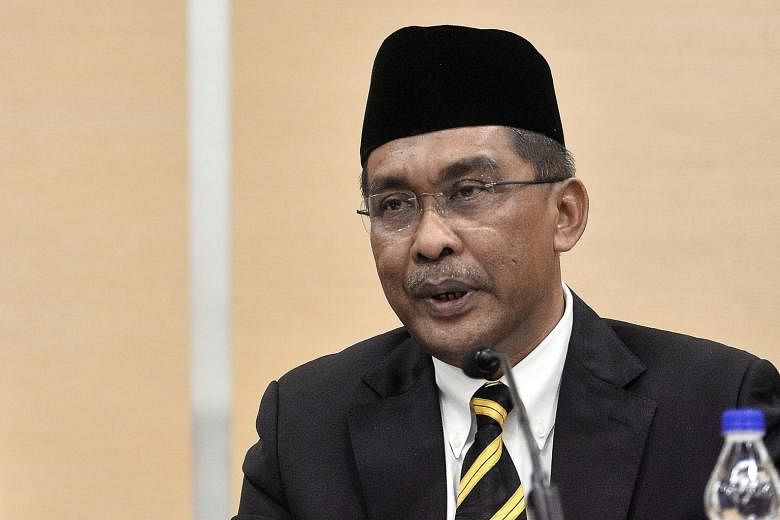KUALA LUMPUR - The Malaysian government is facing criticism from the opposition and rights groups for withdrawing a Bill to limit the country's prime minister to two terms, and another Bill to provide external oversight of the police in cases of misconduct, local media reported.
De-facto Law Minister Takiyuddin Hassan withdrew on Wednesday (Aug 26) the Constitution (Amendment) (No. 2) Bill 2019 regarding the two-term limit, and the Independent Police Complaints and Misconduct Commission (IPCMC) Bill.
The Bills were being pushed by the previous Pakatan Harapan (PH) government led by Tun Dr Mahathir Mohamad, as two major reforms to improve governance.
"There is no need to go ahead with the reforms at the moment," Datuk Takiyuddin said on Thursday (Aug 27) in Parliament, referring to the withdrawal of the two-term limit Bill, in response to questioning by an opposition MP.
Mr Takiyuddin, Minister in the Prime Minister's Department (Parliament and Law), said there was no need for the government to give its reasons for withdrawing the Bill, Malay Mail online news quoted him as saying.
Communications and Multimedia Minister Saifuddin Abdullah, asked by reporters on Wednesday why he supported the withdrawal of the term-limit Bill, said the five-month old Perikatan Nasional (PN) administration is a "different ruling government" from PH that had tabled it.
"I think it is because of a different philosophy, different government and a different way of looking at certain things," he said.
As for the Bill on police oversight, the PN government led by Prime Minister Muhyiddin Yassin had said in March when it just came to power that the Bill would be withdrawn.
Said Mr Takiyuddin on Wednesday: "The decision to withdraw the Bill was made by the government.
"Some of the contents of the bill were not acceptable to police personnel so the government and KDN (Ministry of Home Affairs), decided to introduce a new one (Bill)."
LIMITING PM TO TWO TERMS
The previous PH government introduced the term-limit Bill in December last year, following concerns over abuse of power by a sitting prime minister if the person were to stay in office for too long.
Dr Mahathir himself was prime minister for five terms totalling 22 years, between 1981 and 2003. He was PM for a second time for nearly 22 months from May 2018.
In tabling the Bill last year, Dr Mahathir said PH was planning to limit to two terms not just the tenure of the prime minister, but that of menteri besars and chief ministers of Malaysia's 13 states too.
This was promised by PH in its 2018 election manifesto.
The Bill would have required amendments to Article 43(a) of the Federal Constitution.
Criticising the withdrawal of the term-limit Bill, the PH secretariat said in a statement on Thursday: "One of the main reasons for us to push for the amendment was to ensure anyone does not hold on to the prime minister's post for too long."
The statement was jointly signed by leaders from the three PH member parties, Fahmi Fadzil, Khalid Samad and Liew Chin Tong.
"The amendment would give an opportunity for more political leaders to serve as the prime minister and prevent any possibility of deification culture of a leader," they said, as quoted by Malaysiakini news site.
EXTERNAL OVERSIGHT FOR POLICE
As for the IPCMC Bill, the PH government wanted to create external oversight over issues involving police misconduct such as corruption.
There was also deep concern over the deaths of criminal detainees while in police custody.
Local rights group Suaram said in July last year that between 2011 to 2018, there were 104 deaths in police custody. Most were suspects who were being detained for questioning.
Cabinet minister Takiyuddin, in withdrawing the IPCMC Bill, said the PN government was replacing this with another Bill, for the Independent Police Conduct Commission (IPCC).
But the Human Rights Commission of Malaysia (Suhakam) and other rights groups said the IPCC is a watered-down version of the original Bill.
"Various stakeholders, including Suhakam, and civil society organisations have made numerous recommendations to the govt in the past with the hope to enhance accountability of the police and promote good governance in the country," the national rights group said in a statement on Twitter on Thursday.
" However, this was not realised in the IPCC Bill."
It added: "Suhakam is especially concerned with the lack of independence and weakened functions of the IPCC, as it is not accorded with disciplinary powers to deal with police misconduct."
The rights group pointed out that the secretary of IPCC is to be appointed by the home affairs minister, and the officers of IPCC may be appointed from any government agencies on a secondment basis to be its investigators.
"Moreover, the delegation of IPCC's powers to any members of the police may also raise issues of conflict of interest in terms of the IPCC's stated functions in the Bill and its independence."
Human Rights Watch deputy Asia director Phil Robertson on Thursday expressed outrage at the IPCC and said Prime Minister Muhyiddin Yassin is trying to please the police with the watered-down draft law .
"Draft IPCC Bill in Malaysia Parliament guts any hope of rights respecting police reform and accountability. The draft... basically spits in the face of the royal commission set up to recommend reform," Mr Robertson said. He was referring to the Royal Commission to Enhance the Operation and Management of the Royal Malaysia Police (PDRM) that was set up during the prime ministership of Tun Abdullah Badawi. The commission, headed by former chief justice Mohamed Dzaiddin Abdullah, recommended the setting up of the IPCMC.
"Muhyiddin (is) bending over backwards to secure PDRM political support with total joke IPCC bill. Referring complaints back to the agency or to the police commission ensures more people will die in police detention. Shame!" Mr Robertson said.
The IPCC Bill had its first reading in Parliament on Wednesday, local media reported. A Bill needs to be have three readings in Parliament before it would become law.
But the PN government on Thursday postponed the Bill's second and third reading, the last day of the current Parliament session.
The second and third reading of the Bill will instead be carried out at the next Parliament sitting, The Star reported.


